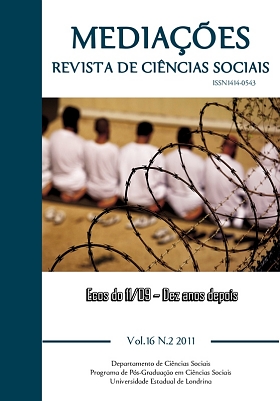Terror: a speech after 9-11
DOI:
https://doi.org/10.5433/2176-6665.2011v16n2p15Keywords:
Terror, Humanities, Secularism, Culture, Religion.Abstract
This article encloses a reflection in the search for responses in face of the anxiety and the necessity of critically explaining, with help of the knowledge of the humanities, the American war on terrorism. In spite of the impossibility of a one response to war, we cannot remain silent. Thus, two questions need to be formulated: “What are some already existing responses? And, how respond in face of the impossibility of response?”. The response of the author is oriented by an understanding of “culture as its own explanations”, from which she undertakes a training into imagining the perspective of the “other” in order to enable the understanding of both the suicide bomber and the war against terrorism. The considerations of the author criticize stereotyped explanations formulated by the right and the left in the USA. Questions concerning gender, reason, religion and culture permeate her analysis, which aims at opening a space for the humanities, the universities and the intellectual to fulfill the task of understanding the “other” and, therefore, of becoming able to delineate an account of the war.Downloads
References
ARENDT, Hannah. Lectures on Kant’s political philosophy. Chicago: University of Chicago Press, 1990.
BENJAMIN, Walter. Critique of violence. In: BENJAMIN, Walter. Reflections: essays, aphorisms, autobiographical writing. Nova York: Schocken, 1978.
CASTLE, Terry. Courage, mon amie. London: Review of Books, 2002.
CHAUDHURI, Kirti N. Asia Before Europe: Economy and Civilization of the Indian Ocean from the Rise of Islam to 1750. Nova York: Cambridge University Press, 1990.
CHOMSKY, Noam. 9-11. Nova York: Seven Stories Press, 2001.
CHOMSKY, Noam. The theatre of good and evil.
CROSSETTE, Barbara. How to put a nation back together again. The New York Times, New York, Week in Review Section, 25 nov. 2001, p. 3.
DAVIS, Mike. Dead cities, and other tales. Nova York: New Press, 2002.
DERRIDA, Jacques. Différance. In: DERRIDA, Jacques. Margins of philosophy. Chicago: University of Chicago Press, 1982.
DERRIDA, Jacques. Faith and knowledge. In: ANIDJAR, Gil (ed.). Acts of religion. Nova York: Routledge, 2001. p. 42-101.
DERRIDA, Jacques. The University without condition. In: DERRIDA, Jacques. Without Alibi. Stanford: Stanford University Press, 2002.
DERRIDA, Jacques. Voyous. Paris: Galilée, 2003.
DEVI, Mahasweta. Douloti the bountiful. In: DEVI, Mahasweta. Imaginary maps. Nova York: Routledge, 1995.
EATON, Richard M. Temple desecration in pre-modern India. Frontline, India, v. 17, n. 25, p. 62-70, dez. 2000.
FLETCHER, George P. Romantics at war: glory and guilt in the age of terrorism. Princeton: Princeton University Press, 2002.
GRACE, Patricia. Baby no-eyes. Honolulu: University of Hawaii Press, 1998.
HARDT, Michael; NEGRI, Antonio. Empire. Cambridge: Harvard University Press, 2000.
HUNTINGTON, Samuel P. Clash of civilizations and the remaking of world order. Nova York: Touchstone, 1997.
KANT, Immanuel. What Is Enlightenment? In: SCHMIDT, James (ed.). What is enlightenment? eighteenth-century answers and twentieth-century questions. Berkeley: University of California Press, 1996a. p. 58-64.
KANT, Immanuel. Religion within the boundaries of mere reasonin. In: GUYER, Paul (ed.). Religion and rational theology. Cambridge: Cambridge University Press, 1996b.
KANT, Immanuel. Critique of pure reason. Cambridge: Cambridge University Press, 1998.
KANT, Immanuel. Critique of the power of judgement. Cambridge: Cambridge University Press, 2000.
LACAN, Jacques. The splendor of antigone. In: LACAN, Jacques. The ethics of psychoanalysis 1959-1960: seminar book VII. Nova York: Routledge, 1992.
LEWIS, Martin W.; WIGEN, Karen E. The myth of continents: a critique of metageography. Berkeley: University of California Press, 1997.
LIPTON, Eric; GLANZ, James. A nation challenged: relics; from the rubble, artifacts of anguish. New York Times, New York, seção 1, 27 jan. 2002.
MANDER, Harsh. Cry, the beloved country: reflections on the gujurat massacre, 2002.
MARWAT, Fazal-ur-Rahim. The evolution and growth of communism in Afghanistan (1917-1979): an appraisal. Karachi: Royal Book, 1997.
MASSELL, Gregory J. The surrogate proletariat: moslem women and revolutionary strategies in soviet central Asia, 1919-1929. Princeton: Princeton University Press, 1974.
MUJTABA ALI, Syed. Works. Kolkata: Mitra and Ghosh Publishers, 1974. v. 7.
OSORIO, Jon Kamakawiwo‘ole. Dismembering Lahui: the history of the hawaiian nation until 1887. Honolulu: University of Hawaii Press, 2002.
PRASHAD, Vijay. War against the planet: the fifth afghan war, imperialism, and other assorted fundamentalisms. Nova Délhi: LeftWord, 2002.
SAID, Edward W. Secular criticism. In: SAID, Edward W. The world, the text, and the critic. Cambridge: Harvard University Press, 1983. p. 1-30.
SAID, Edward W. Gods that always fail. In: SAID, Edward W. Representations of the intelectual. Nova York: Columbia University Press, 1994.
SHELLEY, Percy Bysshe. The defense of poetry. In: McELDERRY, Bruce R. (ed.). Shelley’s critical prose. Lincoln: University of Nebraska Press, 1967.
SLAUGHTER, Anne-Marie. Tougher than terror. The American Prospect, Estados Unidos, 28 jan. 2002.
SPIVAK, Gayatri Chakravorty. Can the Subaltern Speak? In: NELSON, Cary; GROSSBERG, Larry (ed.). Marxism and the interpretation of culture. Urbana: University of Illinois Press, 1988. p. 271-313.
SPIVAK, Gayatri Chakravorty. A critique of postcolonial reason: toward a history of the vanishing present. Cambridge: Harvard University Press, n. 32, p. 26-29, 1999.
SPIVAK, Gayatri Chakravorty. What is enlightenment? Gayatri Chakravorty Spivak conversing with Jane Gallop. In: GALLOP, Jane (ed.). Polemic: critical or uncritical. Nova York: Routledge, 2004. p. 179-200.
SPIVAK, Gayatri Chakravorty. Other Asias. Oxford: Blackwell, 2008.
STOCKHAUSEN, Karlheinz. Attacks called great art. The New York Times, New York, 19 sep. 2001. p. 3.
WORLD BANK. Creating cities that work in the new global economy. Research Bulletin, v. 10, n. 4, oct./dec. 1999. p. 1.
Downloads
Published
How to Cite
Issue
Section
License
Copyright on articles published in Mediações belongs to the author(s): in the case of partial or entire republication of the original publication, we ask author(s) to indicate the original publication in the periodical.
Mediações uses the Creative Commons Attribution 4.0 International license, which allows Open Access, enabling any user to read, download, copy and disseminate its content so long as adequately referenced.
The opinions expressed by the author(s) are their sole responsibility.
































